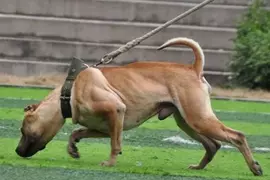Interview with Huang Zhuhua
Mr. Huang Zhuhua, born in 1960, is one of the oldest breeders in China. He is very respected for his knowledge by other breeders. Mr Huang gladly gave me this interview and is very pleased that people in the world are now interested in the original breed in China.
(translation from the Chinese original)
You have a very long history with the Shar Pei. Can you tell us how and when you came into contact with the breed?
I grew up in a family that had earned their living with hunting for generations. As a little boy I always listened to my father's and his hunter friends stories telling me a lot about hunting with dogs. In our village there were always dogs, including Shar Pei. These were difficult times and the care of the dogs in the village was often not easy. If we did not have enough food, the dogs ran to a small pig farm nearby and ate the pig food. Because of this difficult childhood, I had to grow up early.
When I was 14 years old I secretly took the shotgun of my father, skipped school to hunt birds and sell their meat. A few dozen miles away I met an old hairdresser who had a very beautiful Shar Pei bitch. I asked this man to sell me this bitch and he wanted to have 32 yuan from me. In 1974 this was about the annual income of a diligent farmer. I had to leave without the dog.
Every day at school, I thought of this Shar Pei bitch. I secretly sneaked out of school and chased as many birds as I could. That's how I earned a total of 16 yuan. I told a friend of my father, Li Yuchang (黎玉 常), about my intention to buy the Shar Pei bitch from the old man in the faraway village. Li Yuchang gave me 16 yuan and told me to go and buy the bitch. Even thoughI only owed 50 percent, this bitch was my first own Shar Pei.
What do you like most about the breed?
In the past, I also bred other, internationally known dog breeds. Now I'm older and have been concentrating on the Shar Pei for a long time. The Shar Pei has always been part of my life and is the legacy of my ancestors. I especially like the Shar Pei because he is multifunctional:
- He is an excellent family dog.
- He has a solid and strong character.
- He does not bark a lot.
- He is very loyal to his owner.
- He keeps a distance to strangers.
- He is good at guarding the house.
- He is a good hunting companion in the mountains.
- He has a nice short coat.
- He has good health.
- Not many people have a Shar Pei.
What do you answer when asked what to pay attention to when raising a Shar Pei?
The most important thing in raising a Shar Pei is love. Whether you are rich or poor is secondary, but if you lose your love for the dog, you can not raise a good dog.
How important is it for you as a breeder to know your dog's pedigree?
Unfortunately there are not many breeders in China. Dogs whose pedigree can be followed for decades are rare. Previously, no written records were kept. But the more you know about the ancestors of a dog, the better.
You have seen many Shar Pei in your life. What do you think is the overall quality of the Shar Pei in China?
The original dogs are on average of very good quality, visually there are better and worse, but in principle, the low stock of the breed in China is of good quality.
Since the 1990s, meatier Shar Pei have been coming from Hong Kong to China over and over. These dogs are often ill, have skin and eye diseases.
We have often talked about the differences between China and Hong Kong in relation to Shar Pei. Many people do not know these differences. Can you explain the differences?
The biggest difference between Hong Kong and China is that people in Hong Kong have higher education and more opportunities. They can tell much better stories about Shar Pei and thus spread opinions.
We Mainland people have less education, we do not know how to write good stories. We do not know how to market ourselves well. Unfortunately we are very inexperienced with the advertisement for the Chinese Shar Pei.
But it is no longer about making money, it is about the preservation and the love for the Shar Pei.
The only thing that is the same in Hong Kong and in China is the love for Shar Pei.
How much exchange has happened in the past of dogs and knowledge between China and Hong Kong. When did this exchange begin and how did it affect the population of Shar Pei on both sides of the border?
In 1975, the first people came from Hong Kong to China because they were looking for dogs. I got in touch with them back then. The understanding of the breed is different. Most basic knowledge about the breed comes from Uncle Ki. But since this time, the development of personal perspectives has developed in different directions over the decades. Many hybrids were created, which should correspond to the own picture and the own idea.
I believe that a good breeder should not only know his but also other breeds well. Because if you do not know other breeds well, you can never truely understand your own breed. If you only know your own breed, you have to tell stories so others believe you to know your breed well.
In 1989, I saw a meatmouth Shar Pei again, for the first time in 10 years. I've never seen a blue Shar Pei until today. In the fall of 1989, people from Hong Kong brought meatmouth Shar Pei to Dali, and breeding and hybridization with these dogs was promoted.
Shortly thereafter, we founded the Dali Shar Pei Club, recognizing that we need to do something to protect the original type. Unfortunately, the club's first president, Yan Runhe, died after just one year.
Unfortunately, with the club's second president, Xu Jianguo, all good intentions were dashed, as dog traders from Hong Kong exerted a great influence.
In 1997, Dali's Shar Pei Club and the club in Hong Kong merged and a large number of Hong Kong hybrids Shar Pei were advertised. The commercials on radio, television, newspapers and magazines all came from Hong Kong.
I was a dissident at the time because I always wanted to protect the original Shar Pei. At that time I was demoted to the lowest level by a senior member of the club.
After years of co-marketing done by both clubs, many false information circulated about the breed. Today many people think that the meatmouth is correct and the real Chinese Shar Pei is almost unknown.
I have been trying to protect the original breed for decades, but due to the bad economic situation with the Chinese Shar-Pei, I used to have to breed other breeds like the German Shepherd in order to survive.
For almost two years, the situation has been better and Dali's Shar Pei Club has set itself the task of protecting and promoting the real Chinese Shar Pei.
Until recently, there was little knowledge about Shar Pei in China, just a few pictures that could be seen on the Internet. Very often we see dogs on heavy chains. Why is that?
Traditionally dogs are often trained with heavy chains to make the chest wider and stronger, as well as for a stronger waist and more thigh muscles. But it does not have to be a chain, even a rope or a strong leash can be used.
Often dogs are only on the leash for taking a picture.
What are your hopes and wishes for the future of Shar Pei?
I hope that breeders are cautious about the purpose of their breed, that they understand their original meaning and recognize their individual value. It is like sport, the more individual the training, the better will be the result of an athlete.
Breeders should get a good eye for their dogs. The Shar Pei can be very versatile. If he is a good hunter, you train him to hunt, if he is a good athlete, do sports with him, if he likes to present himself, then go and show him at a dog show..
Thank you Mr. Huang for this interview




